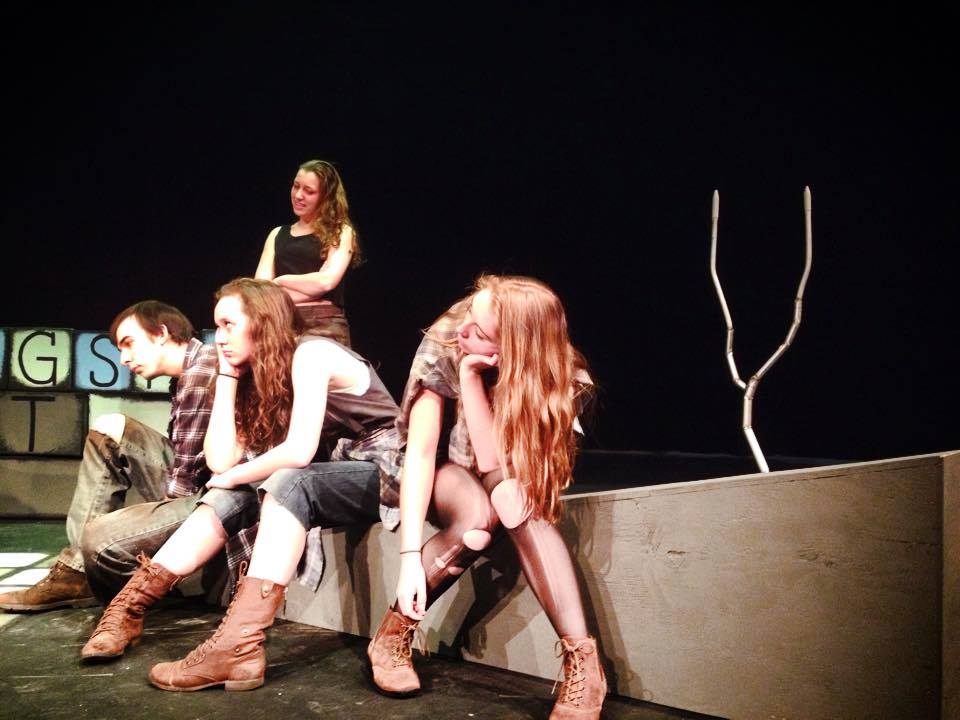It’s winter. It’s cold. The days are dark for far too long. And we are all due for a healthy dose of existentialism.
This Thursday, Friday and Saturday the Calvin Theatre Company will be performing a collection of student-directed, absurdist plays entitled “Existence: The Funniest Thing That Ever Happened to Us.” Performances begin at 7:30 p.m. in the Gezon Auditorium with a talk-back after the show on Friday, Feb. 6.
The show consists of six short plays—two by British playwright Tom Stoppard and four recently translated plays by Jean Tardieu.
Absurdist theater was born in the 20th century and combines many of the surrealist, nihilist and existential questions that percolated through Europe after World War I. In other words, the plays question the meaning and potential futility of existence through a darkly laugh-out-loud humor.
Student director Sharon Suh explains: “Absurdism brings to life all the strange questions we have about life that we all have but don’t necessarily talk about.”
However, as student director Christian Becker said, “The plays will be funny but not straightforward comedy.”
Straightforward is putting it lightly. “In the space of the theater,” said Suh, “anything can happen.”
Each play promises something new, different, hilarious and absurd. Stoppard’s plays are companion pieces, and each incorporates a Shakespeare play, a play within a play. In “Cahoots Macbeth,” the players are putting on “Macbeth” in someone’s living room, but the play is also “about people who were living under the communist regime,” explained student director Cathy Fazio.
The other plays also address the power systems that give order to human existence but simultaneously reduce it to absurdity, whether it is bureaucratic information systems, the power plays in one-on-one relationships or even language itself.
“One of the things that binds these plays together is that the characters are stuck in time. They have no history or sense of who they are or what they need because they can’t see the future or the past,” said producer Stephanie Sandberg. “They are isolated in the performative space and that is all they have.”
“Absurdism puts on stage the fear we have about the futility of existence,” Suh said. “No one really wants to think we are here for nothing.” But absurdism asks audience members to wrestle with that proposition.
“It’s more than just watching story,” said Fazio. “It’s an experience because the plays ask, ‘How are you involved in this story?’”
Becker says many students feel uncertain about their identity and purpose. “We’re all here searching for ourselves,” he said. “We are looking for what we want to do with our life.”
Sandberg also cited the many elements of absurdity and control that plague society, whether it’s satire like the recent film “The Interview” or the extreme surveillance creeping into all corners of life.
However, seeing an uncomfortable possibility can be a backhanded reminder to hope.
“Samuel Beckett [an absurdist playwright] believed where you find hope and meaning in this is in the ‘contour of its opposite,’” Sandberg explained. “In the darkness you see light, in the bleakness you can see hope, in the void you see possibility.”
The impossibly frustrating world of absurdism has opened up exciting new challenges and opportunities for student directors.
“We’ve all found we’ve been able to play around with this stuff,” says Becker. “This is the most creative I’ve ever felt in a production.”
“But you have to put a cap on it at some point—you need to have it contained to a point where it makes sense as a story but is still absurd,” he said.
The directors have also worked closely with the student set designers in the production of properly off-kilter sets with telephones in trees, trash-can boilers and clocks with no hands.
“The audience is in for a good show,” said Suh. “We’re asking questions and using the most creative ways we know to find answers.”
And no matter how “creative” these methods may be, the cast believes their production will be meaningful for audiences. “If you open yourself up to it,” said Becker, “even in these absurd situations, you find the humanity within it.”











